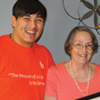Clik here to view.

Protecting Seniors
Dr. Victoria Titterington is bridging the gap between seniors and students in her criminal justice ACE course.Image may be NSFW.
Clik here to view. As part of his class on Aging, Crime and Victimization, senior student Daniel Vazquez recently spent time teaching residents of a senior living facility how to prepare for emergencies using a bingo game.
As part of his class on Aging, Crime and Victimization, senior student Daniel Vazquez recently spent time teaching residents of a senior living facility how to prepare for emergencies using a bingo game.
During the lively game, complete with prizes, Vazquez showed seniors at the Parkview Place Apartments the essentials they would need in the event of a disaster. In exchange, the student, who plans to become a state trooper, learned how to work with an elderly population.
“It definitely was an eye opening experience,” said Vazquez, a senior in the College of Criminal Justice. “It is amazing how you can help someone by doing something little and what a large effect it has…It taught me that you should handle the elderly differently than younger people. You have to be able to communicate with them.”
The lunch time bingo game was a cooperative effort with the City of Houston Mayor’s Office of Public Safety and Homeland Security. They provided the colorful cards illustrating the devices needed and how they can come in handy when facing natural or other emergencies. Participants were given many of these items as prizes during the game.
Vazquez and other students are getting practical experience in the field along with their academic studies in Academic Community Engagement (ACE) classes at Sam Houston State University. In Dr. Victoria Titterington’s class, students can choose from many projects, including Meals on Wheels, assisted or independent senior living facilities, or Adult Protective Services, to learn about the elderly and crime. The writing enhanced course requires nine hours of volunteer work and a journal documenting what students learned along the way.
“I think it is just another way of imparting learning that comes alive,” said Dr. Titterington. “It has become very typical that by the end of the class, at least a few students want to get into an aging-related career. Even when students pursue traditional careers, this equips them with a sense that will enable them to relate to the elderly.”
Dr. Titterington, who has been offering ACE class for four to five years, is one of many professors in the College of Criminal Justice to provide community-based learning opportunities outside the classroom. She teaches both ACE and traditional versions of the course and finds that students in community engagement gain a better understanding of aging issues through direct contact with the elderly.
The College of Criminal Justice offers many ACE classes at both the graduate and undergraduate levels. Among these are:
Criminal Justice and Criminology
- CRIJ 2361 - Introduction to the Criminal Justice System
- CRIJ 2362 – Criminology
- CRIJ 3341 - Aging Crime and Victimization
- CRIJ 3396 - Juvenile Delinquency and Juvenile Justice
- CRIJ 4330 - Law and Society
- CRIJ 4336 - Understanding Human Behavior
- CRIJ 4338 - Child Abuse and Neglect
- CRIJ 4365 - Professionalism and Ethics in Criminal Justice
- CRIJ 4373 - Undergraduate Internship
- CRIJ 4383 - Family Violence
- CRIJ 4384 - Police Strategies
- CRIJ 6338 - Coordinating Victim Services
- CRIJ 6370 - Graduate Internship
- CRIJ 6394 - Crisis Management Integration II
- CRIJ 6394 - Crime Prevention
Forensic Science
- FORS 6371 - Forensic Science Internship
Security Studies
- SCST 5320 - Crisis Management Integration I
- SCST 5338 - Security Management
- SCST 6093 - Independent Study